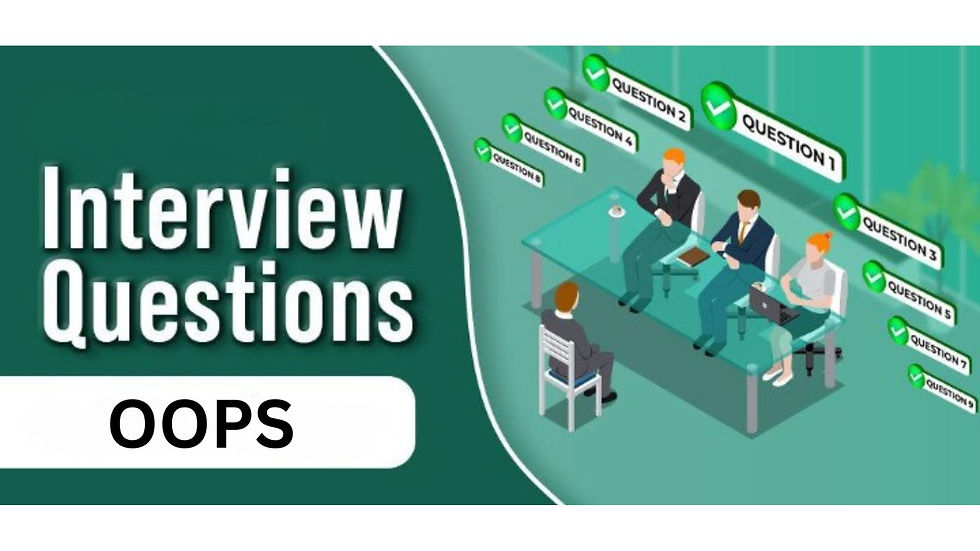What are the key topics and concepts covered in CSS interview questions?
- Divyansh WsCube
- Nov 2, 2023
- 3 min read

Introduction
CSS (Cascading Style Sheets) is a fundamental technology in web development, responsible for shaping the visual aspect of websites. As such, CSS skills are often a focal point in job interviews for web developers, front-end engineers, and designers. To help you prepare effectively, let's explore the key topics and concepts that are commonly covered in CSS interview questions.
1. CSS Basics:
Interviewers often start with foundational questions to gauge your understanding of CSS. These may include:
What is CSS, and what is its role in web development?
How do you include CSS in an HTML document?
Explain the difference between inline, internal, and external CSS.
2. Selectors and Specificity:
Your ability to select and style HTML elements is a crucial aspect of CSS. Expect questions like:
What are CSS selectors, and how do they work?
How is specificity calculated, and why is it important?
Explain the concept of the universal selector and pseudo-classes.
3. Box Model:
Understanding the box model is essential for layout and positioning. You might be asked:
What is the CSS box model, and how does it work?
How can you control the dimensions of elements using padding, margins, and borders?
Discuss the differences between box-sizing: content-box and box-sizing: border-box.
4. Positioning and Layout:
CSS provides various techniques for controlling the layout of web pages. Questions may revolve around:
Explain the differences between relative, absolute, and fixed positioning.
How do you create a centered or fixed header/footer layout?
Discuss the role of display, position, and float properties in layout design.
5. Flexbox and Grid Layout:
In modern web development, Flexbox and Grid Layout are crucial for responsive design. You might be asked:
What is the Flexbox model, and when is it best used?
Explain how CSS Grid Layout differs from Flexbox and provide use cases for both.
How do you create a responsive, multi-column layout using CSS?
6. Responsive Web Design:
Ensuring web pages work well on various devices and screen sizes is essential. Expect questions on:
What is responsive web design, and how does CSS play a role in it?
How do you implement media queries for responsiveness?
Discuss best practices for creating a mobile-first responsive design.
7. Transitions and Animations:
Interactivity and user experience are enhanced through CSS transitions and animations. Questions may include:
What is the difference between CSS transitions and animations?
How do you create smooth hover effects using CSS transitions?
Provide examples of CSS keyframe animations and their use cases.
8. CSS Preprocessors:
Familiarity with CSS preprocessors like Sass and Less is increasingly valued. You may be asked:
What are CSS preprocessors, and why are they used?
Explain the benefits of variables and nesting in Sass.
How do you compile and integrate preprocessed CSS into a project?
9. Cross-Browser Compatibility:
Ensuring your CSS works consistently across different browsers is vital. Questions may revolve around:
What are the common challenges in cross-browser CSS development?
How do you approach browser-specific CSS issues, and can you provide examples?
10. Optimization and Performance:
mark down Copy code
- Interviewers may assess your ability to optimize CSS for performance. Questions might include:
- What techniques can you employ to improve CSS performance?
- Explain the importance of minimizing the use of `!important` in CSS code.
- How do you reduce HTTP requests and improve page loading times using CSS?
Conclusion
Remember that in addition to answering technical questions, it's important to demonstrate problem-solving skills, practical experience, and an understanding of best practices. Be prepared to discuss real-world scenarios where you've applied CSS to address specific design challenges and optimize web pages. With a solid grasp of these key CSS topics and concepts, you'll be well-prepared to shine in your CSS interview and contribute effectively to web development projects.



Comments